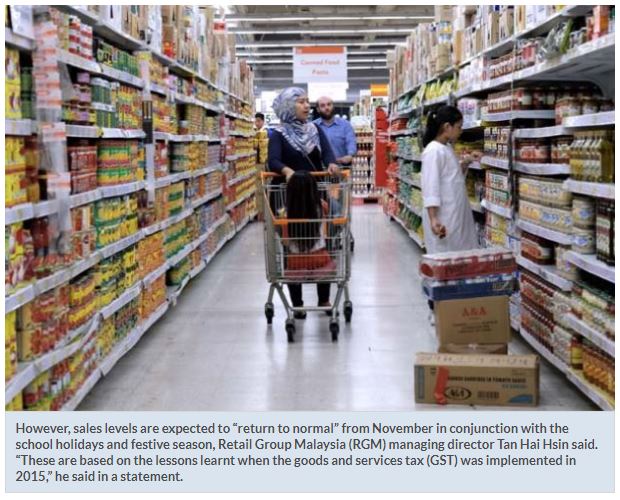Malaysia: SST seen to affect retail sales
PETALING JAYA: Retail sales are expected to drop significantly in the first two months following the reintroduction of the sales and services tax (SST) on Sept 1, as consumers adopt a more cautious approach to spending.
However, sales levels are expected to “return to normal” from November in conjunction with the school holidays and festive season, Retail Group Malaysia (RGM) managing director Tan Hai Hsin said.
“These are based on the lessons learnt when the goods and services tax (GST) was implemented in 2015,” he said in a statement.
An analyst concurred, pointing out that sales fell sharply when the GST was introduced in April 2015.
“There was a knee-jerk reaction following the implementation of the GST as shoppers became cautious. However, many retailers started seeing a pick-up in sales by the fourth quarter of that year, as consumers got used to it.
“The year-end school and Christmas holidays also bolstered spending. Furthermore, the year-end is usually a time when employees get paid their annual bonuses, which will bolster retail spending.”
Yesterday, Finance Minister Lim Guan Eng announced that the provision of services would be taxed at 6% under the reintroduced SST, while the sales of goods would incur a 10% tax, effective Sept 1.
“Under the proposed SST bill, goods will be taxed at 10%, while the provision of services will be taxed at 6%,” he said.
Tan, however, said there is still a need for more information on the implementation of the SST.
With greater clarity, he said it would be easier for the public to better understand the workings of the SST compared with the GST.
RGM is projecting the retail sector to chalk up a growth of 5.3% this year following the 14th general election, revising its earlier estimate of 4.7%.
Tan said the projection was based on measuring consumer sentiment that was boosted following the election on May 9.
On the general outlook for the second half of 2018, Tan said the inability of the ringgit to improve in the immediate term would lead to a higher cost of imports, namely raw materials, semi-finished goods and end-products.
“The minimum wage is set to increase from RM1,000 to RM1,500, which would lead to higher retail prices.
“The new pricing system on petrol would also affect the cost of living and retail prices,” he said.
Source: https://www.thestar.com.my/business/business-news/2018/07/18/sst-seen-to-affect-retail-sales/#mX2DAvWQIA6vgK0x.99


 Thailand
Thailand




